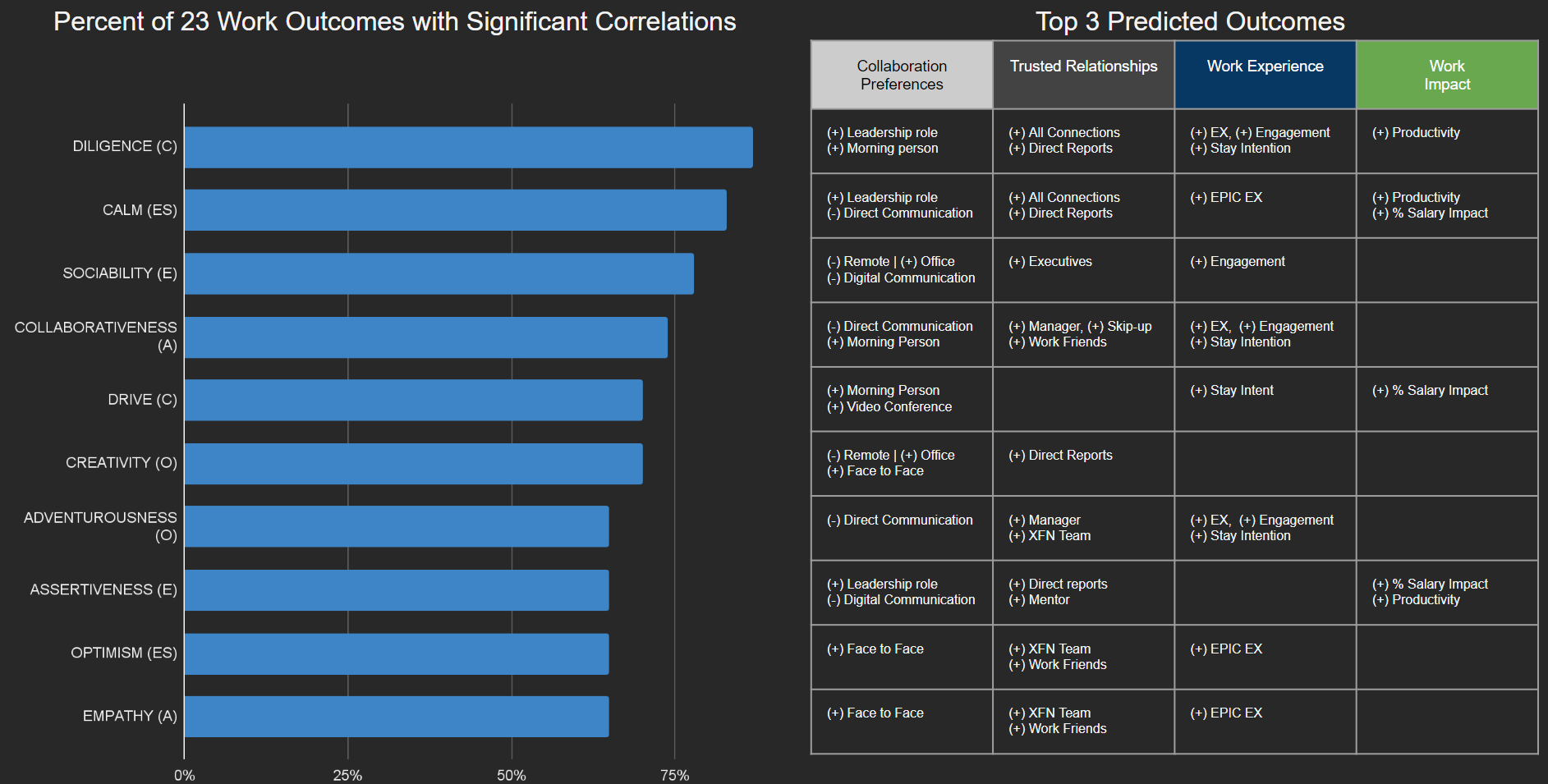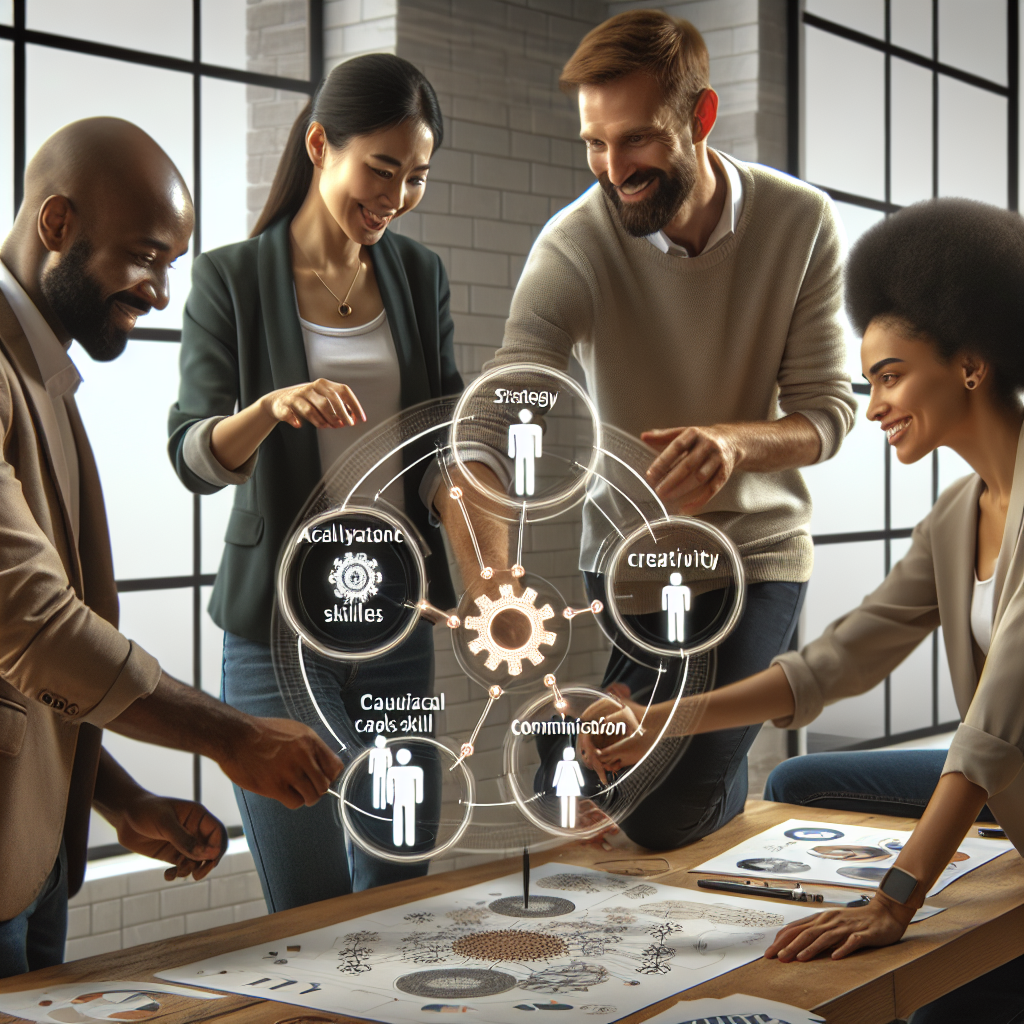
Unlocking the Power of Personality
Effective relationships, collaboration, experiences and impact in the new world of work
By Ken Oehler, Ph.D.
Senior Partner, Head of People Science
What do we really know about our co-workers’ motivations, values and thought patterns that shape their behavior? How many times at work have you thought “why are they doing that?” What if people had better insights into their own personality “wiring” and that of their teammates - or of colleagues they do not yet know - that could enhance their work journey and effectiveness if only they did? Personality is widely used in academic and business environments as a predictor of performance in individual selection decisions. However, personality profiles are rarely shared with individuals or teams except in instances of leadership coaching and development. And, the use of personality assessments are not broadly applied across the full employee journey. Personality provides tremendous insight into the why, what and how behind organizational behavior, and can be the key to empathetic connection and understanding among co-workers. Insights in the hands of individuals and teams (delivered individually, at scale, through the power of A.I.) can empower and accelerate better decisions, relationships, collaboration and impact across the work journey.
Personality Matters
What traits are your co-workers looking for in you, and what do they have to do with your personality? RADICL conducted personality, work preference and effectiveness research with 500 U.S. employees in November 2023 to explore these dynamics. In one open-ended question, we asked respondents to describe people they have worked with when they have been most fulfilled and energized at work. Their input indicates that people want to work with smart, skilled professionals, but that’s not the top theme. The loudest themes have more to do with the work styles and personalities of co-workers. The graphic to the right shows that collaborative, enthusiastic, friendly, kind, and hardworking are the top 5 most frequently used descriptions of people we love to work with. Further, we can apply many listed traits of “great” co-workers to the Big 5 model of personality and see that people tend to value agreeable, conscientious and emotionally stable coworkers the most.
Conscientiousness is typically given the most attention as a predictor of individual performance. Wilmot & Ones (2019) reviewed 92 meta analyses to find conscientiousness has desirable effects on 98% of 44 work variables examined. However, there is an opportunity to broaden the lens on uses, factors of personality and outcomes to empower individuals and teams with insights to enhance effectiveness.
For example, Lim, et al (2023) have shown Agreeableness to be useful in aligning team members during uncertainty (and who isn’t faced with uncertainty in the current techno-social-economic shifts?). Openness and Emotional Stability, in addition to Conscientiousness, have been linked to effective leadership. And, Tony Boyce and I published research finding that elements of Agreeableness, Emotional Stability and Conscientiousness predict an employee’s own engagement in their work and whether someone will be a leader that is engaging of others.
Personality Traits that Unlock Work Effectiveness
There is an opportunity to widen the aperture of work outcomes and use cases, and make these insights more widely available to help people and teams navigate to their intended destinations. So, we tuned our current employee research to explore personality’s impact on how people and teams will experience work and perform in new hybrid and technology-connected environments. Analyzing respondents’ RADICL Personality Inventory scores revealed some useful predictive relationships with 23 potential work outcomes across collaboration preferences, trusted relationships, the work experience, and work impact.
The ten sub-facets of the Big 5 had multiple significant correlations across the 23 work outcomes tested. Across all of these outcomes, we found that aspects of Openness (adventurousness), Conscientiousness (diligence) and Emotional Stability (calm) have the strongest predictive impact on the range of outcomes tested. Exploring each area in more detail, we see some interesting nuances where aspects of Extraversion (sociability and assertiveness) and Agreeableness (collaborativeness and empathy) matter as well:
Work Collaboration Preferences. Introverts do, in fact, prefer full-time remote work more than social Extraverts; and Extraverts are more likely to prefer more in-office days. We also see Openness to new experiences (adventure and creativity) playing a role in preference for hybrid and more days in the office. People higher in assertiveness and lower in collaborativeness are more likely to want direct communication styles. And again, we see Extraversion playing a role in preferred modes of communication, where Extraverts are more likely to prefer face-to-face, phone or video; and Introverts are more likely to prefer digital communication modes of email, text, chat.
Trusted Work Relationships. Our research illustrates that all of the Big 5 elements play a role in developing these trusted and productive relationships, with elements of Openness (adventurousness), Conscientiousness (diligence) and Emotional Stability (calm) having outsized weight in building and maintaining trusted relationships. In addition, collaborativeness is important in trusted relationships “up” with one’s manager, the skip-up manager and executives, and “across” with XFN teams. For those managing others, calm, assertiveness and diligence play a significant role in leadership success.
The Work Experience. An EPIC work experience full of meaning, clarity and connection is related to all of the Big 5 personality elements but seems to be most strongly predicted by Emotional Stability, Agreeableness and Openness to new experiences. A meaningful work experience is uniquely predicted by optimistic adventurousness; clarity is uniquely related to calm assertiveness; and connection is most uniquely predicted by a calm and collaborative approach. Engagement at work is predicted by adventurousness, sociability, collaborativeness, optimism and drive. Intent to stay with an organization is predicted by a similar set of traits as engagement, with stronger weight placed on drive, calm and optimism.
Work Impact. Forty-nine percent (49%) of work impact (defined by productivity and business impact as a percent of salary) can be explained collectively by work preferences, trusted relationships and the work experience - as well as personality. Assertive, adventurousness, driven and calm styles are most predictive of having work impact, but we see that aspects of all Big 5 facets and sub-facets play a role.
Using Personality Insights to Help People and Teams Navigate
Understanding one’s own personality and the personality of others can help build empathy, trusted connections, and empower people to navigate new realities of hybrid, distributed and technology-enabled work. RADICL’s market research with HR executives finds a strong opportunity to enhance effectiveness through empowerment and trust in moments like team alignment, team profile matching, onboarding, mentoring, culture alignment and navigating change. Personality insights can help individuals, teams and organizations in two ways: 1) to help find situations with strong alignment or “fit” between personality and environment, and 2) to intervene or compensate when personality and environment are misaligned. Here are some use cases that are particularly top of mind for leaders.
Empowering Individual Effectiveness:
Navigating Remote/Office/Hybrid Work
Personality traits can be useful in determining whether a remote/office job would be a good fit or to provide navigational guidance on asynchronous or in-person work. If you are high on Extraversion, remote might not be for you. Or, people who are more Introverted or more sensitive to uncomfortable office dynamics could be empowered by technology-enabled insights and nudges for appropriate conflict management behaviors and how to build emotional resilience (e.g., a recent study found that 46% of GenZ are uncomfortable with face-to-face interactions in the office).
Building and Maintaining Trusted Connections
RADICL’s research from February 2024 illustrated the positive impact of trusted relationships on productivity. People low in diligence, collaborativeness, emotional regulation and adventurousness may need help building trusted relationships with direct and extended connections critical to their success. Finding network matches for mentoring, onboarding or extended leadership influencers based on commonalities, complementary fit, or advance understanding of work styles could be particularly useful. Those low on assertiveness and diligence could benefit from trust-building questions served up through technology-enabled nudges in these critical work interactions.
Visibility for Performance, Promotion and Pay
Productivity and impact are a function of drive, diligence, and openness to new opportunities. Emotional regulation also plays a strong role in that negativity and excitability are likely derailers to performance and trajectory. Our research also highlighted an interesting relationship between assertiveness and work impact. Other studies have found that people higher in assertiveness are more likely to initiate salary negotiations. Perhaps similarly, someone low in assertiveness is less likely, and could use assistance, to compile work stories that self-advocate for performance impact that would likely lead to better performance reviews, promotion opportunities and pay. Introverts can be helped with curiosity and assertiveness strategies for visibility in the workplace.
Enhancing Team Effectiveness:
Distributed Team Building & Alignment
Coordination, Competence and Connection are required for “fluid team” effectiveness. Coordination will be found in having a sufficient number of people high in diligence and drive in the right roles. In addition to the skill make-up of the group, team competence can be enhanced by the adventurousness and assertiveness that leads to learning and decisiveness. Connections will be facilitated by calm, optimistic, collaborative styles. Building understanding of - and synergies across -diverse personalities on a team are critical to team effectiveness. Imagine if insights on individual and aggregate personality styles were used to build, align and empower the multiple distributed/XFN teams on which 66% of people are working.
Hybrid Communication & Collaboration Routines
Hybrid and distributed teams have increased the complexities for when and how teams communicate and collaborate. And, there are numerous and overwhelming potential communication channels in most organizations. People higher in social extraversion, optimism and creativity tend to prefer in-person communication; and people who are more private, reserved or excitable are more likely to prefer digital or asynchronous communication. Assertive, individualistic and calm people are more likely to communicate in a direct manner. And the people high in drive and diligence are likely to be “morning people.” Insight into team predispositions with A.I.-driven suggestions could be very useful in determining how and when hybrid teams communicate, collaborate and come together.
Purposeful Culture Building
Most leaders are concerned with creating the right culture that aligns with value creation. Previous research has shown that decisive, long-term oriented, proactive, transparent, people-oriented cultures outperform the S&P 500. These culture traits align with assertive, diligent, collaborative and empathetic personality traits. Imagine Natural Language Processing aggregating organizational communication and work styles at scale to determine the real culture not captured by surveys. Intentional selection, promotion and deploying leaders and teams with culturally aligned personalities could then accelerate organizational beliefs, decisions and behaviors that create value.

Knowledge is Power
It’s time to empower people with insights on the profound impact personality has on work preferences, collaboration, experiences and impact across the work journey. What if we possessed a clearer understanding of our own predispositions, but also that of our teammates, unlocking better collaboration and effectiveness as we embark on the future of hybrid, distributed and technologically-enabled work? With the rapid advancements in AI-enabled work technology, it’s time to seize this opportunity to harness mass customization of work insights at scale to help individuals and teams navigate through organizational friction and toward more fulfilling, impactful work journeys. Personality is just one part of the puzzle that, when integrated with other critical work data, can enhance decision-making, collaboration, connections and collective impact. Without this collection of data-driven guidance, people may feel more like work is left to chance. The time is now to empower epic work journeys for everyone.









